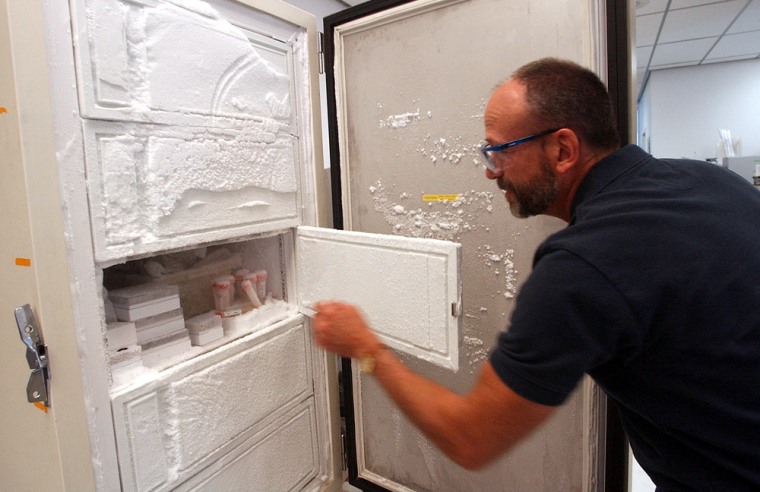The creatures are known as “extremophiles,” and they earn the name: They live in toxic Superfund cleanup sites, boiling deep-sea rift vents, volcanic craters and polar glaciers — some of the planet’s harshest environments.
These single-celled creatures owe their hardiness to genes, and that has drawn the attention of a few biotech companies. The companies train the genes to mass produce industrial-strength enzymes for such products as better detergents, cleaner chemicals and more effective DNA fingerprints.
Such “bio-prospecting” efforts have huge potential for good. They just might make hazardous waste cleanup more affordable, reduce pollution and make better medicines if the microbes’ genetic durability can be exploited and controlled.
But tough questions are being raised as well — about the morality of allowing private companies to patent and profit from Mother Nature.
'Conan the Bacterium' a favorite
The extremophile candidates are numerous. There’s Deinoccus radiodurans, dubbed Conan the Bacterium by its legions of fans because it withstands 10,000 times the amount of radiation that would kill a human. Found on radiated food, it has a unique ability to repair broken DNA.
In Chile’s moonlike Atacama desert — one of Earth’s driest spots — lives another extremophile scientists say could give them clues to what life might look like on Mars.
And the Pentagon’s research arm, the Defense Advanced Research Projects Agency, is sponsoring experiments on genetically engineering extremophiles to extend the shelf life of blood-clotting platelets in extreme conditions. The idea is to help treat battlefield wounds.
Objections to such work often come from activists who complain that Third World countries aren’t properly compensated for microbes extracted from their deserts, mountains and sea shores.
“The concern with bio-prospecting is that the people who consider themselves to be the stewards of the biodioversity in a region often aren’t consulted or are ignored,” said Beth Burrows of the Edmonds Institute, a environmental nonprofit based in Edmonds, Wash.
Hawaii eyes moratorium
Native Hawaiians are angry over a deal between the University of Hawaii and a biotechnology company to share in potential profits gleaned from lava sludge. Now the Hawaiian Legislature is considering a moratorium on the transfer or sale of extremophiles found on public lands so environmental and profit-sharing issues can be worked out.
Antarctica is governed by an international treaty that vows to keep the continent open and free to scientists dedicated to peaceful pursuits. But some 92 patents have been filed in the United States and another 62 in Europe that claim ownership of biological property found there.
While such patent applications appear to be legal, “some scientists active in Antarctica worry about whether outright commercial exploitation and patents are within the spirit of the treaty,” said Sam Johnston, who co-wrote a report on the subject for the United Nations this year.
The Edmonds Institute sued the National Park Service in 1997 after it gave San Diego-based Diversa Corp. commercial rights to prospect for extremophiles in the fabled hot springs of Yellowstone National Park. The prospecting, involving fees and royalties paid to the government, was ultimately approved by a judge on the condition that an extensive environmental review be completed.
The park service has defended the deal — which remains on hold pending the review — as a way for it to profit on scientific research without disrupting the park’s environment. Four decades ago, the park service wasn’t so financially savvy when a University of Wisconsin researcher discovered the extremophile Thermus aquaticus in a Yellowstone hotspring.
Yellowstone gets no profit
Today, that bacterium provides a key enzyme — polymerase — used for polymerase chain reaction, better known as PCR, a Noble Prize-winning DNA fingerprinting technique used widely by crime labs, hospitals and university researchers.
Yellowstone doesn’t receive any income from sales of the PCR enzyme, now a key tool in the $300 million-a-year DNA fingerprinting business.
The companies involved say that without the ability to patent extremophiles, they can’t make good on the many promises of this area of biotechnology.
David Estell, a researcher at Genencor International Inc., said bio-prospecting requires the collecting of just a few samples, which hardly disturbs the environment.
Genencor is one of the few profitable biotechnology companies in existence, earning $13 million in the first quarter of 2004 on $94 million in revenue.
African enzymes in jeans
Genencor has the genetic material of 15,000 strains of microbes stored in deep-freeze in Palo Alto and the Netherlands. It already has 11 industrial products on the market, and is using living material — enzymes and proteins, rather than fossil fuels — to develop cleaner and cheaper ways of making industrial chemicals.
For instance, Genencor takes a gene that gives a microbe alkaline resistance and uses it to create enzymes for laundry detergent. One enzyme is used in Tide detergent, another is used to give jeans a faded look.
Both are produced by extremophiles found thriving in highly alkaline lakes in East Africa and Kenya. The extremophile genes responsible for making these enzymes are genetically engineered into commonplace bacteria, which are then coaxed to grow by the trillions in giant brewers’ vats at Genencor’s nine factories around the world.
“The goal,” Estell said, “is make proteins do something they’ve never done before.”
